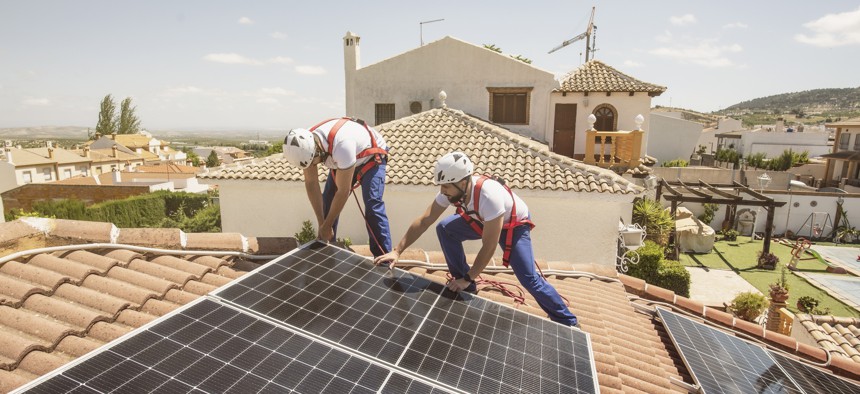Government software that shines: Solar permitting’s bright future in 2024

July Alcantara/GettyImages
COMMENTARY | By automating the permitting process for rooftop solar, cities and counties can save time and money for their building departments and homeowners.
As the United States races to fight climate change, rooftop solar and batteries are an increasingly popular solution. Although there are already millions of installations, only 4% of the nation’s 75 million homes have installed this technology. Over the next decade, more people will seek to install solar and batteries at their homes with the help of federal incentives coming from the Inflation Reduction Act. However, these families will face unnecessary barriers to their installs—burdensome red tape at the city and county level that slows down installation timelines, leads to project cancellations and hurts overall efforts to facilitate climate resiliency.
Right now, it can take anywhere from several weeks to several months for a local jurisdiction to issue permits for rooftop solar and battery projects. The good news is that free software developed by the federal government can solve this precise problem. Called SolarAPP+, this online tool for local governments helps all parties involved save thousands of dollars, frees up permitting time for strapped city and county building departments and cuts numerous days off wait times for anxious solar and battery customers. SolarAPP+ is already reducing permitting delays and increasing adoption of solar. As we move forward, we hope to double down on this progress in 2024.
As the new executive director of the SolarAPP+ Foundation, a nonprofit organization founded to completely automate the permitting process for residential rooftop solar and storage, I’m personally thrilled to see the tremendous growth and progress the solar industry made in 2023, and I’m looking forward to seeing even more residential solar installations this year. Cities and counties can lead the way in making this process much more simple for their constituents.
By working with over 500 municipalities across the U.S. to implement solar energy best practices, we were able to help standardize burdensome paperwork, reduce permitting times from weeks or months to mere minutes and facilitate a significant increase in safe installations. As Department of Energy Secretary Jennifer Granholm described in her open letter to America’s mayors, after automating its residential solar permitting process, San Jose, California, saw a 600% increase in approved projects. And in Tucson, Arizona, SolarAPP+ slashed review times from 20 business days to zero. Automation allows more residents to install solar energy systems and aids the transition to carbon-free electricity.
In 2022, National Renewable Energy Lab reported that across 31 communities, over 11,000 permits were submitted using SolarAPP+—a 300% increase from the previous year. For 2023, it’s even higher at just over 18,000. The streamlined permitting through SolarAPP+ is saving nearly 10,000 hours of local government staff time as projects are completed 13 days faster on average.
The fruits of simpler permitting extend beyond helping installers, governments and families save time. Homeowners and businesses also benefit financially. The Solar Energy Industries Association estimates that soft costs like permitting add $7,000 per installation. With rapid approvals through a streamlined permitting process, consumers can avoid these expenses and more easily transition to cost-effective clean energy.
In December, the Energy Department announced that 160 jurisdictions across the United States have fully adopted SolarAPP+, and that this has saved more than 33,000 hours of permitting time for building departments and homeowners. The benefits are clear, but now what’s needed are robust efforts to help local governments adopt this tool.
Legislation like California's Senate Bill 379 demonstrates how state policymakers can drive local permitting progress. This bill required most large cities and counties in the state to implement an automated online platform like SolarAPP+ by September 2023. Now that the law is being implemented, nearly 70% of Californians will be benefiting from instant approvals for most solar installations. Such regulations ensure more equitable clean energy access while upholding safety standards. Enacting sensible laws to codify streamlined approvals represents meaningful progress.
I’m eager to work with anyone and everyone to bring the benefits of this tool to cities and counties across the United States. The outlook for U.S. solar energy shines brightly thanks to recent successes unlocking access to tools like SolarAPP+. We must work together to continue to tackle barriers to address climate change.
Mark Rodriguez is the executive director of the SolarAPP+ Foundation. He previously led code compliance at the rooftop solar and battery company, Sunrun.





